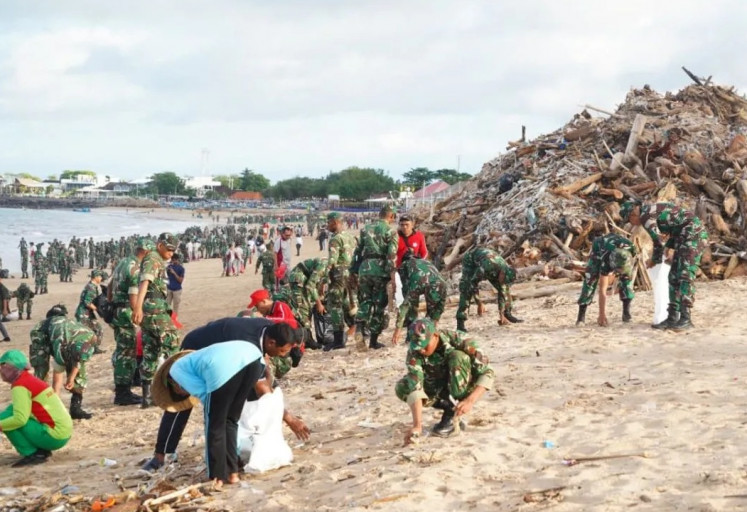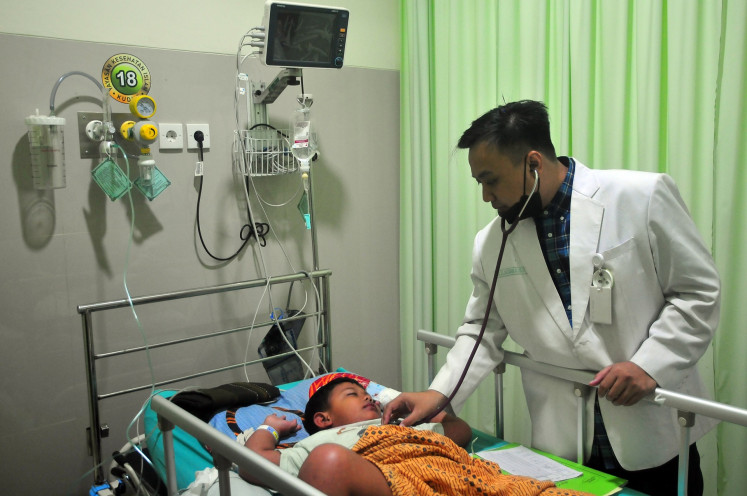Popular Reads
Top Results
Can't find what you're looking for?
View all search resultsPopular Reads
Top Results
Can't find what you're looking for?
View all search resultsUrgent measures needed to provide SRH services during COVID-19
Sexual and reproductive health services is among the essential services that have been neglected as health systems refocused to address the COVID-19 pandemic, even as cases of domestic violence increase around the world during enforced lockdowns.
Change text size
Gift Premium Articles
to Anyone
L
ike the governments of many other countries, our government is focusing on how to flatten the curve of COVID-19 infection, while risking further neglect of sexual and reproductive health (SRH) services. This particularly affects areas already lacking these services, which include youth-friendly family planning services, essential services for women and girls who have been subjected to violence and HIV/AIDS treatment and support services.
Despite the pandemic, the World Health Organization (WHO) has stated the importance of maintaining SRH services "to protect the rights of vulnerable sections of populations comprising women, children and adolescents".
Ideally, we possess sexual and reproductive health when the needs of our physical, mental and social wellbeing related to our sexuality and reproductive system are met. These issues range from how to attain pleasurable and safe sexual experiences to having a healthy reproductive system, functions and processes.
However, as the COVID-19 pandemic continues, the healthcare system is being pushed to their limits. The focus on maternal health services is declining, at least at the local puskesmas (community health centers) that I am working with in three different villages in West Lombok, West Nusa Tenggara.
Rutgers WPF Indonesia, an NGO specializing in sexual and reproductive health and rights, has managed a focused SRH program in this regency since 2016 because of the high proportion of underage marriages (1,038 girls) and of teenage pregnancy, found among 106 out of 152 girls, or 69.7 percent.
Routine prenatal care checkups have been halted to avoid the risk of infection and are currently provided only for women with pregnancy complications. The three midwives in these villages have also reduced their working hours since the epidemic emerged in the region, from every day to once every two days, excepting emergencies.
Reduced maternal health services during a public health emergency raises the risk of complications and pregnancy-related deaths.
As most factories have closed or reduced their working hours, delayed manufacture and distribution could lead to a shortage of contraceptives, potentially increasing cases of sexually transmitted diseases (STDs) and unplanned pregnancies. Poor women in particular face the risk of unsafe abortions, hemorrhages and miscarriages, all of which raise the risk of maternal mortality, parenting stress and the baby blues, apart from increased financial difficulties.
Neglecting SRH services also means disabling the entry points through which women are more likely to report domestic abuse and through which professionals and volunteers identify and support women and girls who are or have been subjected to violence and abuse. These women and girls are also likely receiving counseling through SRH services or at least referrals to more specialized government services like the Integrated Women's and Children's Center (P2TP2A), the Integrative Child Welfare Center (PKSAI), local social service offices and the local police.
Without the SRH services provided through local institutions that women are more familiar with, such as puskesmas, victims of violence, particularly domestic violence, are unlikely to report the abuse. These women are more likely to use only antenatal care services.
An increase in violence against women during the pandemic has been widely reported in various countries, including Indonesia. The United Nations Entity for Gender Equality and the Empowerment of Women (UN Women) said that this was caused by the magnified concerns regarding security, health and money, which then created more tension due to the stressful living conditions under lockdown policies.
Reduced SRH services therefore means that women lose a valuable resource for seeking help in addressing and reporting any acts of violence. Health facilities and providers have a very essential role in ensuring that services for victims of abuse and violence remain accessible during the COVID-19 outbreak.
We should not let the “new normal” phase mean the normalization of less access to SRH services and information. Underprioritizing SRH services could undermine the extensive work and investments made in advocating sexual and reproductive health as a major agenda of Indonesia’s development goals.
Identifying opportunities for best practices in providing SRH services and information could be a substantial step in adapting to this health crisis. This could include providing informational materials on SRH in the Sasak language of West Lombok on WhatsApp and local radio stations, or announced by local mosques, developing broader health services provided with less physical contact during examinations (e.g. remote pregnancy monitoring via WhatsApp or phone calls) and providing more information on self-care.
For the longer term, the health system should be strengthened to ensure the continued provision of essential services – services that also integrate gender-based violence serices – during public health emergencies.
We should encourage the government to take measures to address these challenges. If we do not start taking steps now, people – especially vulnerable groups – will continue to face hardships now and after the pandemic. Urgent and realistic measures are needed for avoiding infection while still continuing to deliver essential services during the COVID-19 pandemic.
***
The author is a Rutgers WPF Indonesia district coordinator for a program on ending child marriages, teenage pregnancy and female genital mutilation based in West Lombok, West Nusa Tenggara.










